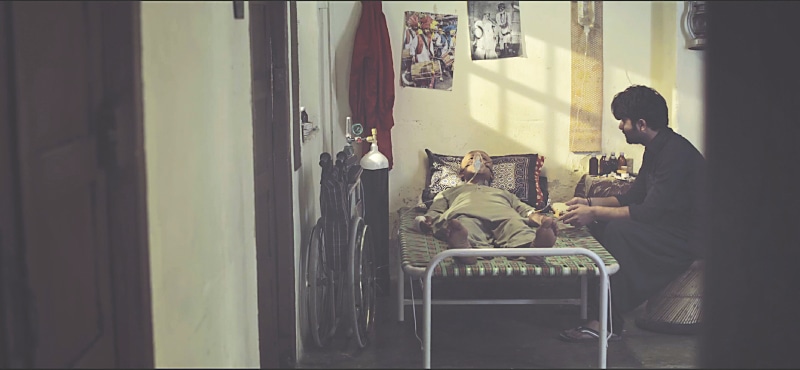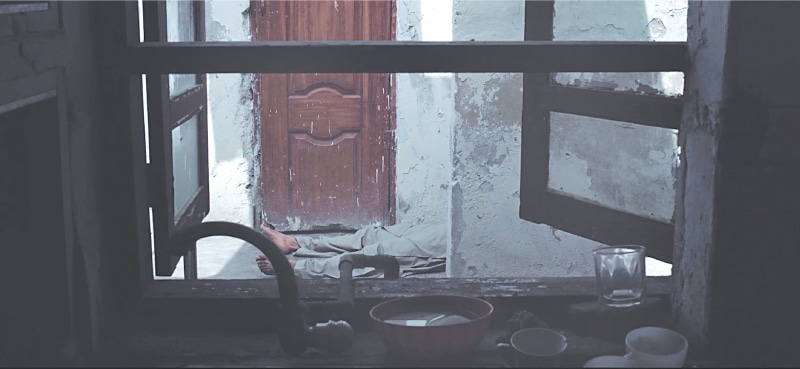
“I don’t want to be stamped as a Sindhi language filmmaker. I want to be known as a filmmaker, who sometimes makes Sindhi films,” Rahul Aijaz tells me over the phone.
At half-hour, this has been one of the rare, short conversations between us.
Aijaz — who started out as a student of film from Szabist, became a notorious film reviewer for Express Tribune, turned film teacher at the Institute of Business Management (IoBM), and is now a filmmaker — often enjoys getting side-tracked during long phone calls.
Surprisingly, his short film A Train Crosses the Desert stays on-track (apologies for the pun).
The film recently had its Pakistan premiere at the Arts Council of Pakistan, and has been showcased at the prestigious Kazan International Film Festival of Muslim Cinema, the South Asian International Film Festival (NYC, US), the Jaipur International Film Festival (India), Muestra Itinerante De Cine Mx-MICMX (Mexico) and the Asian Film Festival, LA (USA).
Like the filmmaker Rahul Aijaz’s love for the movies, which runs deep and serious, graveness and solemnity seeps into every nook and cranny of his Sindhi short film A Train Crosses the Desert
It was also a finalist at LIFFT India Filmotsav — World Cine Fest (India) and the 8th International Silk Road Film Awards (Turkey), and was an honorable mention at the Deep Focus Film Festival (USA). Like Aijaz’s love for the movies which runs deep and serious, graveness and solemnity seeps into every nook and cranny of his short, whether it’s the subject, the temperament of the narrative, or the production design.

The majority of the film sits tight in a cramped little room, where two brothers — one gravely ill, the other his caretaker — contemplate life and death. It’s a quaint, heart-wrenching experience that stems from a world of hurt and a fascination for the macabre, Aijaz explains.
“I have been moved and inspired by the idea of death — particularly suicide — for a while now,” he explains.
Aijaz lost his uncle to suicide at the age of five and then his 22-year-old cousin to cancer roughly two years ago.
The news of his cousin’s demise came in the middle of the premiere of the Moammar Rana-starrer Azaad, I recall. They were close, despite the age difference.
Aijaz, whose imagination has been set afire by the works of David Lynch, the French New Wave and neorealism, grounds his entire narrative on the conversation between brothers (played by Nadir Hussain and Tariq Raja) — both innately aware that cancer is dragging their lives into the gutter.

Rather than spell things out, Aijaz keeps his film subtle. There is an understated deliberation between brothers about euthanisia, with an ever-present sense of guilt of surviving and moving on weighing heavily on the caretaking sibling.
The parallel between Aijaz’s inner voice and the actions of the characters is hard to dismiss during the almost 20-minute film.
Financed by the Goethe-Institut under their Film Talent programme, and the support of IoBM, every frame is cramped with detail. For example: in the middle of a scene, one shot slowly shifts focus to a patch on the wall that has height markings of growing children on it. It’s a minor shot, but it lends gravity to the circumstances the two brothers are going through.
The title, Aijaz says, comes from Egyptian poet and journalist Ashraf Aboul-yazid’s poem A Train Crosses the Desert from the book The Memory of Silence (the film opens with A Prison, another poem from the book). The translation from Arabic to Sindhi was done by Nasir Aijaz, the filmmaker’s father.

The choice of shooting the film in Sindhi is deliberate. No one entertains the idea of making content in the language, Aijaz fumes. In fact, he has never seen a Sindhi film in his life. With a lack of an archival system, most films in the language are lost to time and regional television networks of the language, he says, only produce cliched content that barely scratch the surface of Sindhi culture.
Aijaz doesn’t want the label of a Sindhi filmmaker, though. His next short film is in Urdu and the one after that will probably be in Sindhi, he elucidates. His long term goal is to make a Sindhi feature film but, given the state of Pakistani cinema — and owing to his own experience as an entertainment journalist and reviewer of Pakistani films — he is not that hopeful of miracles.
The best bet is to make a film for the international audience, take it to festivals and then bring it to Pakistan, he had told this writer once. A Train Crosses the Desert seems like a fine case study in that regard.
Published in Dawn, ICON, October 10th, 2021















































Dear visitor, the comments section is undergoing an overhaul and will return soon.